Blagdon Lake Birds
January 2016 News
Friday 1st January [Overcast and cool with rain in the afternoon]
Happy New Year from Blagdon Lake Birds!
I had an entertaining 6 hours from 0840-1440 hrs at the lakeside today (when steady rain set in), and managed to see or hear no fewer than 66 species. I couldn't find a Gadwall or a Goldcrest either... Anyway, to the news. Kicking off 2016 was a mobile Great White Egret Ardea alba, 3 Black-necked Grebes Podiceps nigricollis, the adult ♀ Red-crested Pochard Netta rufina, 4 Little Egrets Egretta garzetta, 2 Egyptian Geese Alopochen aegyptiaca, and the Common Sandpiper Actitis hypoleucos, of note. Aside from 3 Goosanders Mergus merganser and a Common Chiffchaff Phylloscopus collybita, everything else was pretty much what I'd expect to find at this time of year - given a bit of luck. Other counts included c. 50 Northern Lapwings Vanellus vanellus, 45 Fieldfares Turdus pilaris, 31 Northern Shovelers Anas clypeata and 2 Eurasian Siskins Carduelis spinus. I've started the site 2016 Bird Year List, so if you have any species to add (with the date) please let me know.
Saturday 2nd January [Persistent rain clearing through by afternoon]
I only had an hour at the lake this afternoon, during which time I saw 2 Black-necked Grebes Podiceps nigricollis, 3 Little Egrets Egretta garzetta, and 2 Egyptian Geese Alopochen aegyptiaca of note. The water level continues to come up very rapidly and I would say is about 85% (cf. 71% on 1st Dec). There was no sign of the Great White Egret and there were fewer Common Pochard around than yesterday.
Sunday 3rd January [Lots of rain in the morning clearing through mid-afternoon]
I went down to fill the feeders when the rain stopped, and had a look around for about an hour afterward. I saw just the one Black-necked Grebe Podiceps nigricollis, the Common Sandpiper Actitis hypoleucos and 4 (adult ♂, 3♀♀ ) Goosanders Mergus merganser and, as I wasn't able to view the gull roost properly due to the wind direction, I counted 22 (9 adult ♂♂) Common Goldeneyes Bucephala clangula at the dam end as they gathered to roost together. There was a lot of courtship display by the drakes which was fun to watch (albeit far too far out to photograph) and when I counted another time I totalled 22 with 7 adult ♂♂, so perhaps there were more than 22 in total - it was too dark to tell by then. Nevertheless, 22 is a good count for Blagdon and the best this winter. I added a couple of new species to the site list for 2016: squealing Water Rails Rallus aquaticus in Pipe Bay reeds, and a ♂ Tawny Owl Strix aluco singing from Lodge Copse as I left.
Monday 4th January
News from Paul Williams of a Great White Egret Ardea alba and 3 Black-necked Grebes Podiceps nigricollis. Thanks Paul.
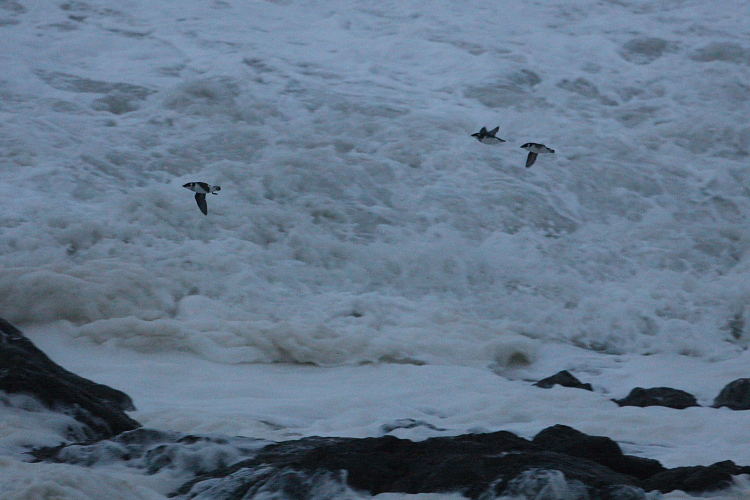
I was up at 0330 hrs to join Jack and Matt Willmott, and driver Pete Massey for a mad twitch to the Shetlands to see the Mourning Dove. We arrived in Aberdeen in plenty of time for the ferry, so drove along the road to Girdle Ness where there was a terrific storm battering the shore and a 'wreck' of Little Auks taking place. We saw at least 150-200 in just over half an hour battling their way along the shoreline trying to stay away from the land. Pete had never seen Little Auk to this point, even though he's probably seen over 500 species of bird in the UK, so he was over the moon with the close views we were afforded. These shots are not the best in the world by any means, but they were taken at 1620 hrs in the north of Scotland in storm conditions, using my Canon 1Ds Mk111 at 1/320th sec at f5 using ISO3200. I very rarely ever use my Canon cameras at more than ISO400 because the images start to get noisy. It's something that Nikon got on top of much quicker than Canon, although the 1Dx is a huge step forward I'm given to understand. At least you can tell they're not Kittiwakes, and it captures an amazing few minutes of birding - nature in the raw.
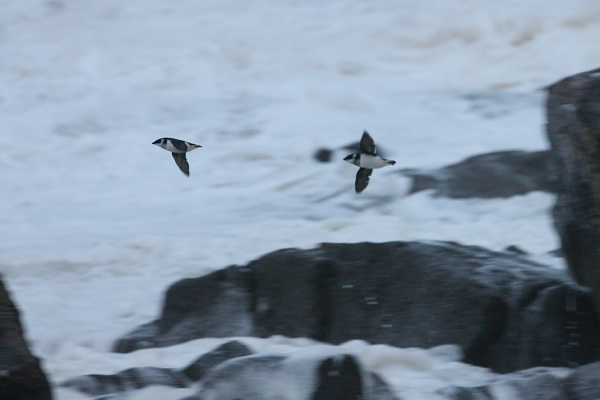
We made our way back to the ferry terminal and booked our passage, only to discover that there would be a very significant delay to our departure due to the weather. We debated if we should abandon our quest long and hard, but decided that if the ferry left before midnight we MIGHT just have enough daylight on arrival in the Shetlands to twitch the dove and jump back on the returning ferry, because predictions were that it would probably be the last of the week, with another huge storm arriving. We left our berth at 2300 hrs, by which time I was dosed-up with Stugeron and laying out in my 'pod' in anticipation of a bumpy crossing!
Tuesday 5th January
No news from Blagdon today.
We arrived in Lerwick at 1130 hrs and got straight into the taxi we'd arranged to get us across town. We saw the dove within a very short time and enjoyed excellent views thanks to the guy who found it. He invited birders into his garage from where we could see the birds come down to seed he put out in his back garden. I guess the dove was no more than 5 metres away at times. It was quite aggressive toward the larger Collared Doves and I reckoned it to be about the size of a Starling (albeit with a longer tail). We stayed in the area watching it on and off in the hail showers, having thanked the 'very nice man' for his generosity, then hired a taxi back to the ferry terminal.
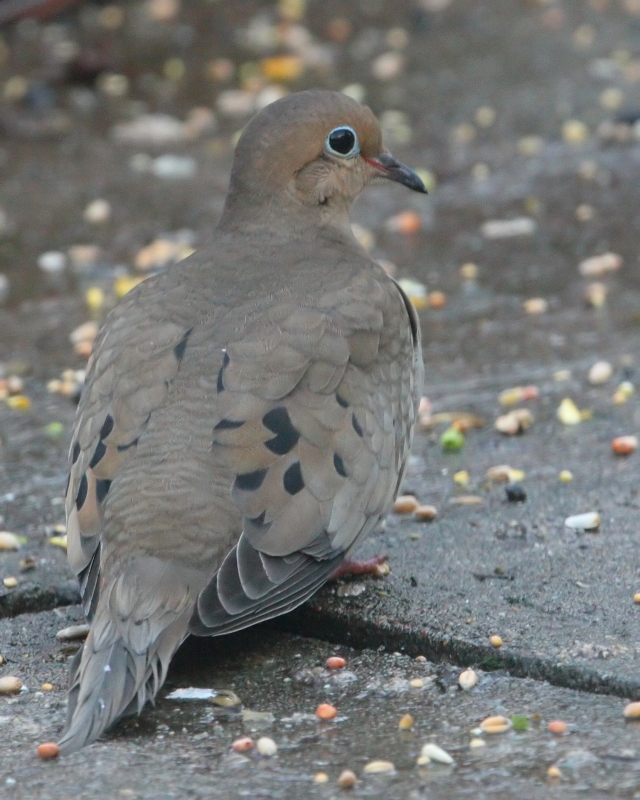
We spent a couple of hours in town, drinking tea and looking around, then headed back to the ferry hoping against hope that it would sail in the evening. Good news, it would sail, but as the weather was so rough we would not get back to Aberdeen until about 1100 hrs (instead of 0800 hrs), as we'd have to proceed at reduced speed. I had a meal, then dosed up with Stugeron again and went down to my bunk at 1830 hrs as things started to get decidedly bumpy.
Wednesday 6th January
The first call on the ships intercom came at 0700 hrs calling us to breakfast. I turned over and tried to sleep some more... 4 more hours of rolling about, trying to eat and keep my breakfast down wasn't an option! At 0915 hrs the last call to breakfast came with the news that we would dock at 1020 hrs. After nearly 15 hours in my bunk, I decided to risk it and staggered along the pitching deck to the restaurant to meet the others and have some sustenance. As I finished my meal the captain told us all to remain seated as we went into harbour because he was going to bring the ships stabilizers in, and he said this would mean our final turn could be rough. We'd made it - all we had to do was drive home.
We picked the car up, Pete filled her up on the way out of town, and off we set. Despite the driving rain and gale force winds we made good time to Glasgow. We stopped at Happendon Services on the M74 and had a comfort break, jumped back in the car and... it wouldn't start! Arghh! Pete called the rescue services and we were put on a low loader to Biggar, where his tank was emptied of the petrol he'd put into it - instead of the required diesel (what a silly billy)! 3 hours and more tea later, we set off for home again. Thankfully, this stretch went without a further hitch until we got to Gloucester, when we were diverted due to the M5 being closed. I arrived home at 2345 hrs, happy but shattered! Were we mad? Probably, just a little! But Matt saw his 500th British bird species, and it'd been one hell of an adventure!
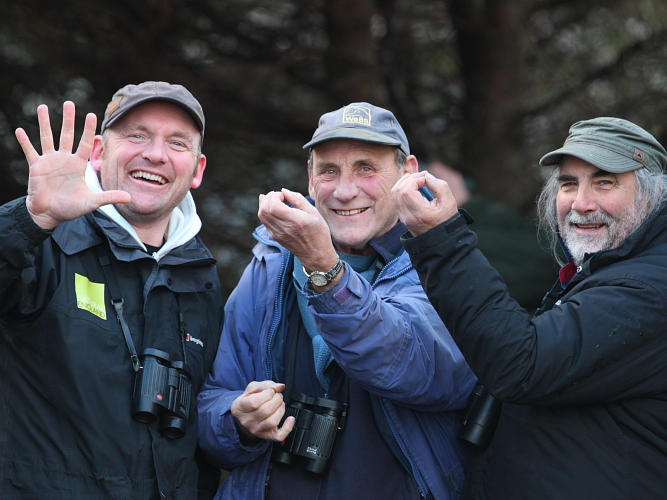
Thursday 7th January [Sunny, but with a piercing cold wind.]
I only had time to go and get some bird food and fill the feeders this afternoon rather than have a good long look around. I saw a single Black-necked Grebe Podiceps nigricollis off Wood Bay Point, but that was about it for today.
Friday 8th January [Mainly sunny, though chilly.]
As 'Tweeted' by Chris Craig earlier, all 3 Black-necked Grebes Podiceps nigricollis were still present between Rugmoor Point and Wood Bay Point this afternoon. There were lots of gulls on the water as dusk fell, but I couldn't find anything new among them. During the course of the weekend, it is highly likely that water will be running over the overspill again.
Steve Hale photographed the Common Sandpiper Actitis hypoleucos on the overspill and reported the first Goldcrests Regulus regulus of the year.
Saturday 9th January [More rain]
The 3 Black-necked Grebes Podiceps nigricollis were all together to the east of Wood Bay Point this afternoon at 1400 hrs, and new in were 2 adult ♂ Greater Scaup Aythya marila off Spinney Point when viewed from the dam at 1410 hrs. They looked fairly mobile and are probably best looked for from Butcombe Bank or the north end of the dam (but you might need a scope).
I've added some photos and a blow-by-blow account of our trip up t'north earlier in the week (see below starting on 4th January).
Sunday 10th January [Mainly grey and overcast with some rain]
There was no sign of the Greater Scaup this afternoon when Bill Urwin came over the hill to look for the 3 Black-necked Grebes Podiceps nigricollis with me (we saw the grebes between Wood Bay and Rugmoor Points). There were 10 Barnacle Geese Branta leucopsis in the Canada Goose Branta canadensis flock and about 40 Northern Lapwings Vanellus vanellus at Green Lawn, while the Common Sandpiper Actitis hypoleucos was along Butcombe Bank when not disturbed by walkers, and the pair of adult Goosanders Mergus merganser, although not feeding together, were both visible from the dam.
The gull roost this evening was almost entirely Black-headed Gulls Chroicocephalus ridibundus, with very few large gulls, but it did include a single adult winter Mediterranean Gull Larus melanocephalus, the first I've seen at the lake for quite a while.
I noticed a couple of Bramblings coming to the feed put out at home a couple of days ago, and they're back again today, digging in to the sunflower hearts that I put on the ground to feed finches (to preclude the risk of disease being passed on from feeders).
Monday 11th January [Overcast, showers, then a bright sunny afternoon. Cool.]
The 3 Black-necked Grebes Podiceps nigricollis were still in the broad area between Rugmoor and Wood Bay Point this afternoon, and the pair of Egyptian Geese Alopochen aegyptiaca were on Green Lawn for a while before flying towards the dam. I was amazed to find a single Cuckooflower Cardamine pratensis flowering at Top End, and added Goldcrest Regulus regulus and Common Kestrel Falco tinnunculus to my site year list. Paul Williams saw the Common Sandpiper Actitis hypoleucos on the dam. I was wrong about the lake filling up, it is lipping the overspill today but not quite flowing over yet.
Tuesday 12th January [Windy with sunny spells]
Andy Davis rang me (thanks for the call) as I was going out of the door to say 5 wild swans were flying towards Blagdon, so I was hopeful I'd make it down the hill in time to see them. I couldn't spot them with a quick scan from the dam, but as I let myself onto site, I met Andy Stockhausen and we went for a look at Top End, where we found 5 adult Bewick's Swans Cygnus columbianus bewickii. They didn't appear settled, presumably because they couldn't reach any food with the high water level, and sure enough they'd flown off within an hour of their arrival. Andy and I saw the 3 Black-necked Grebes Podiceps nigricollis in the usual area, and glimpsed 6 Eurasian Siskins Carduelis spinus feeding in Alders at Hellfire Corner. With a clearer view than Sunday, I only saw 9 Barnacle Geese Branta leucopsis this morning.
The lake filled to 100% today, with water flowing steadily down the spillway. In 2014 the lake reached top level on 9th January, and last year it was 8th January.
Wednesday 13th January [Mainly sunny]
The 3 Black-necked Grebes Podiceps nigricollis were feeding together off Rugmoor Point at 1100 hrs this morning. New in was a pair of Gadwall Anas strepera off Peg's Point, and a fine ♂ Brambling Fringilla montifringilla was at the Lodge feeders (probably present yesterday as well). Oh, and there were 10 Barnacle Geese Branta leucopsis again today!
Thursday 14th January
I didn't get to the lake today, I'm on a short trip to the snowy north visiting family. However, Mike O'Connor emailed that he'd seen a small group of Common Snipe Gallinago gallinago by the Top End hide.
Sunday 17th January [Overcast with a bitter easterly wind]
Back from my trip up north, I went down to the lake when the murk and thick mist dispersed after lunch. I filled the feeders and had a look around, but the only notable birds that I saw were the 3 Black-necked Grebes Podiceps nigricollis feeding together off Rugmoor Point, and later in Wood Bay. I checked the gulls that were in to roost by 1545 hrs, but there were no 'white-wingers' or 'ringers' among them up to that point.
We had 2 Bramblings Fringilla montifringilla in the garden again today with the large finch flock that's attracted daily to the sunflower hearts put out on the ground.
Monday 18th January [Overcast and grey, with drizzle on a stiff breeze for much of the day.]
I only had time for a quick look just after lunch when I met Paul Williams who said he hadn't seen much. I saw 2 of the Black-necked Grebes Podiceps nigricollis. There was horizontal drizzle which, despite having the hood of my scope extended, kept misting up the glass, so I couldn't find the 3rd bird. Then I had to leave to carry out my first Voluntary Bat Roost Visit of the year. We will be carrying out the WeBS count tomorrow morning so, hopefully, more news then.
The Patchwork Challenge team have announced some of the results for last year, including the Inland South Minileague which I took part in:-
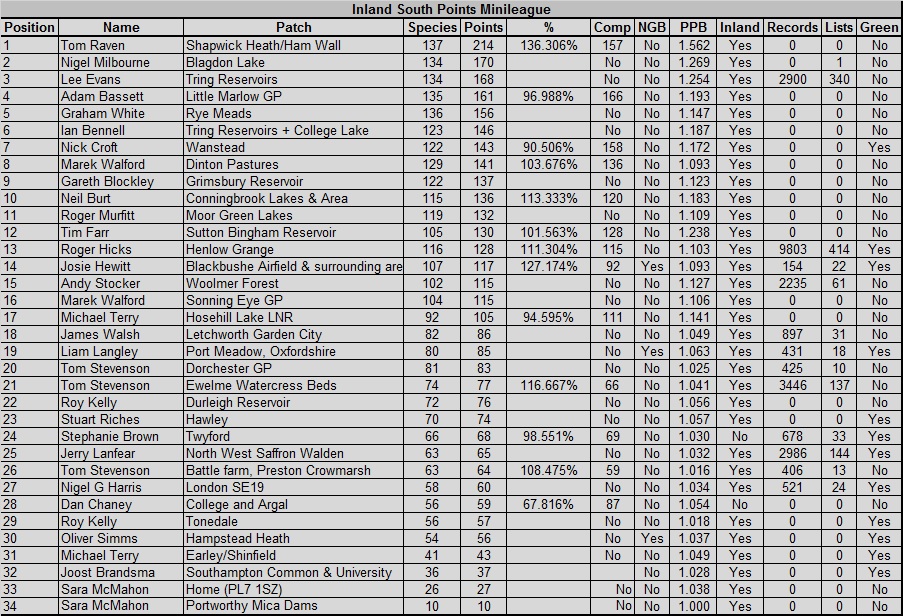
Congratulations to Tom Raven who had a fabulous year, and who is up for the Forest Optics 'Best Find' (Hudsonian Godwit), which I've voted for of course. It's interesting to see that the top few all saw a similar number of species - mid-130s. The Inland North Minileague winners did rather better, with two guys seeing more than 140 spp, another with over 150 spp. and their winner got 161 spp at Fairburn Ings RSPB. It'd be nice to see some of you Chew regulars have a go and see how many you can get there (though you might have to limit which bit of the lake you choose). The Coastal South Minileague saw Paul Bowerman in 4th with 172 spp. at Severn Beach, Roger Musgrove 8th with 139 spp. at Wall Common, and Pete Hazelwood in 10th with 149 spp. at Oldbury Power Station. So our area was pretty well represented. Have a look at the Patchwork Challenge home page and join the competition for a bit of fun in 2016.
Tuesday 19th January [Overnight frost, followed by a bright sunny, but cold, day.]
We carried out a leisurely WeBS count today and saw 3 Black-necked Grebes Podiceps nigricollis between Wood Bay and Rugmoor Points, the pair of adult Goosanders Mergus merganser in Butcombe Bay, and the wintering Common Sandpiper Actitis hypoleucos on the dam. 436 Common Coots Fulica atra, 387 Canada Geese Branta canadensis, 315 Tufted Ducks Aythya fuligula and 169 (97♂♂ & 72♀♀) Common Pochards Aythya ferina were the top waterfowl counts.
The gull roost was disappointingly small this evening with just 800 Black-headed Gulls Chroicocephalus ridibundus, 3 Common Gulls Larus canus, 2 Great Black-backed Gulls Larus marinus, 7 Lesser Black-backed Gulls Larus fuscus and 12 Herring Gulls Larus argentatus. Additionally, a Little Egret Egretta garzetta flew in over the spillway from the west at dusk.
Wednesday 20th January [Sunny and cold]
Although visiting the lake briefly, I didn't have time for any 'real' bird watching.
Thursday 21st January [Mainly overcast but milder. Some drizzle.]
This afternoon there were a pair of adult Common Shelducks Tadorna tadorna at Green Lawn, and I saw a pair of Egyptian Geese Alopochen aegyptiaca fly onto the lake from Holt Farm. The 3 Black-necked Grebes Podiceps nigricollis were feeding together off Rugmoor Point, and there seems to have been an influx of about 40-50 Gadwall Anas strepera (I'll count them tomorrow). I counted 52 Eurasian Wigeon Anas penelope today (cf. the under count of 20 on Tuesday, due to their feeding in marginal vegetation and being hidden from view).
Friday 22nd January [Rain then sun]
We still have 3 Black-necked Grebes Podiceps nigricollis on the lake, all of which were feeding together this afternoon not far off Wood Bay Point. The only other notable birds were the pair of adult Goosanders Mergus merganser in Butcombe Bay, and although I checked the bathing Common Gulls Larus canus carefully, there were no unusual gulls that I could see.
Saturday 23rd January [Mainly dry and breezy]
After a morning spent underground carrying out bat hibernation survey work, I got to the lake late this afternoon and found the 3 Black-necked Grebes Podiceps nigricollis right over at Rugmoor where there also a an adult winter Mediterranean Gull Larus melanocephalus sitting on the water briefly, before it presumably flew off to Chew with the Common Gulls Larus canus. From there we went back to the dam to look through the roost where there was a second, near-adult summer Mediterranean Gull in the throng.
Sunday 24th January
No news today. I was on a bat hibernation check in Wiltshire - 5hrs underground - and got back after dark.
Monday 25th January [Overcast with drizzle in the afternoon]
The 3 Black-necked Grebes Podiceps nigricollis seem to have settled into regular feeding together over at Rugmoor Point recently, where they were this afternoon. Fewer Canada Geese Branta canadensis were present than during the WeBS count, but I noticed an adult Greylag Anser anser with them in Holt Bay and saw the pair of Egyptian Geese Alopochen aegyptiaca on Green Lawn. Late on, the Common Sandpiper Actitis hypoleucos was on the dam.
Tuesday 26th January [Windy and, ultimately, wet.]
Steady rain forced me to have a look around from my car rather than walk this afternoon. I saw the 3 Black-necked Grebes Podiceps nigricollis (1 off Wood Bay Point and 2 off Rugmoor Point), but there was no sign of the Greylag or Egyptian Geese. Not a day for birding...
Wednesday 27th January [Overcast most of the day]
The 3 Black-necked Grebes Podiceps nigricollis were together off Wood Bay Point late this afternoon, and there were 2 pairs of adult Goosanders Mergus merganser off Butcombe Bank. I checked the gull roost without finding anything unusual, but there was a roost of 25 (7 adult ♂♂) Common Goldeneyes Bucephala clangula at the dam end off Pipe Bay.
Ken Anstey and I spent most of the day re-stringing two harp traps that we were using last year. It's the first time either of us have done this, but it seemed to go pretty well. We did test them before bagging them up, so I hope the strings don't all start 'pinging' when they get used for the first time this spring!
Thursday 28th January [Sunny and bright]
Unusually, there were 5 Egyptian Geese Alopochen aegyptiaca on site this morning (equalling the site record count), and the 3 Black-necked Grebes Podiceps nigricollis were feeding together as usual off Rainbow / Wood Bay Points, their ruby red eyes showing beautifully in the sunshine. Also reported were some Eurasian Siskins Carduelis spinus at the Lodge feeders, with European Goldfinches Carduelis carduelis, and at least one ♂ Goosander Mergus merganser was noted in Butcombe Bay.
Friday 29th January [Mainly overcast and grey]
I didn't visit the lake today.
Saturday 30th January [A bitterly cold wind with sunny spells]
Avon Birds reported 5 Egyptian Geese Alopochen aegyptiaca and the 3 Black-necked Grebes Podiceps nigricollis today. This afternoon, I saw 2 of the Egyptian Geese, 7 Barnacle Geese Branta leucopsis, and 170 Common Pochards Aythya ferina.
Sunday 31st January [A wild, wet, and windy day]
Gale force winds and driving drizzle discouraged me from spending too long at the lake today, although I did have a reasonable look around this afternoon. The 3 Black-necked Grebes Podiceps nigricollis were in Wood Bay, but I didn't seen any of the Egyptian Geese. I also spotted 10 Common Snipe Gallinago gallinago, but it was so rough, I decided against trying to go through the gull roost this evening. Yesterday, I noticed we had a lone juvenile Mute Swan Cygnus olor on the lake at Top End. Sadly, I found its predated carcass on Green Lawn this afternoon - I'm guessing it had decided to roost there and was killed by a Red Fox Vulpes vulpes. Mute Swan adults drive their young of the previous year away as spring approaches, and this is a particularly dangerous time for them, as they try to make their way in the world.